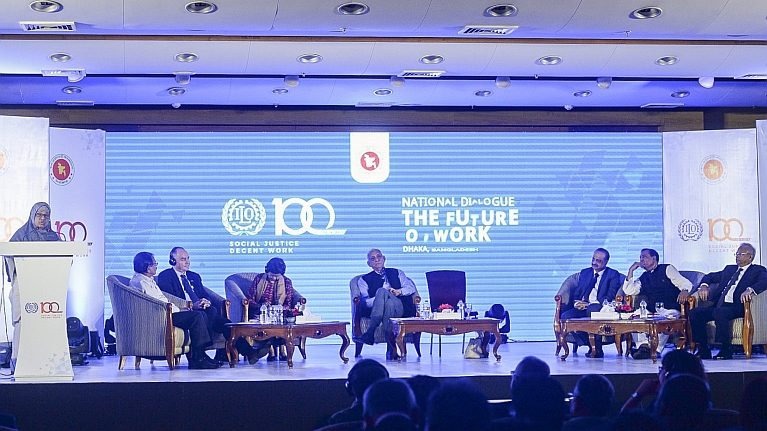ILO National Dialogue on Future of Work
Government, employers and worker leaders emphasize on tripartite consultation, skills building and ratification of ILO Conventions on minimum age and forced labour

The national dialogue brought together high-level government officials and representatives from workers’ and employers’ organisations to examine the present conditions of work and employment in Bangladesh, and also to seek solutions for future challenges.
Professor Dr Gowher Rizvi, International Relation Affairs Adviser to the Honourable Prime Minister of Bangladesh was present at the event as the Chief Guest. The event was chaired by Begum Monnujan Sufian, MP, Honourable State Minister of the Ministry of Labour and Employment.
Also taking part were Foreign Secretary, Md Shahidul Haque; Labour Secretary, Mr K M Ali Azam; Secretary of the Ministry of Law, Mr Naren Das; Executive Chairman of National Skills Development Authority, Md Faruque Hossain; Additional Secretary of Technical and Madrasah Education Division (TMED), Mr A.K.M. Zakir Hossain Bhuiyan; Additional Secretary of the Ministry of Expatriates’ Welfare and Overseas Employment, Dr Ahmed Munirus Saleheen; Inspector General of the Department of Inspection for Factories and Establishments (DIFE), Mr Shib Nath Roy; Director General of the Department of Labour (DoL), Mr A. K. M. Mizanur Rahman; President of Bangladesh Jatiya Sramik League (BJSL), Mr Fazlul Haque Montu; Chairperson of National Coordination Committee for Workers Education (NCCWE), Md Anwar Hossain; Member Secretary of NCCWE, Dr Wazedul Islam khan; General Secretary of Jatio Sramik Jote Bangladesh, Mr Naimul Ahsan Jewel; President of Bangladesh Employers Federation (BEF), Mr Kamran T. Rahman; Secretary General of BEF, Mr Farooq Ahmed; Committee Member of BEF, Mr Tahmid Ahmed; Deputy Regional Director of ILO Regional Office for Asia and the Pacific, Ms Panudda Boonpala; and Country Director of ILO Bangladesh, Mr Tuomo Poutiainen.
Addressing the event, Professor Dr Gowher Rizvi congratulated the ILO on its 100th anniversary. He said, “ILO stands prominent by serving humanity for the last century. Today not only do we celebrate what ILO has done but what the organization will do in future. Unfortunately, labour is still often seen as a commodity. Workers should be equal partners and this can be done by giving them equitable share of the wealth they create.”
As the Chair of the event, Begum Monnujan Sufian, MP, spoke about the reform in the labour administration to improve safety, welfare and access to justice for workers. She said, “I would like to acknowledge the support of the ILO in our journey since 1972. There is increasing use of automation, artificial intelligence and robotics in enterprises. To address the challenges that may rise from these technological changes, harmonious cooperation between workers and employers is important.”
In his welcome address, Labour Secretary Mr K M Ali Azam said, “The ILO brings tripartite representatives of the government, workers and employers to promote social justice and decent work. Effective functioning of this tripartite cooperation is essential for achieving equality and sustainability.”
Speaking as Special Guest, Ms Panudda Boonpala thanked the Government of Bangladesh, workers and employers organisations, as well as development partners for working towards decent work in the country. She said, “We hope that Bangladesh will ratify Convention 138 on the Minimum Age for working and Convention 29 on Forced Labour, and by doing so this nation will complete the ratification of all core labour standards of the ILO.”
Labour leader, Mr Fazlul Haque Montu acknowledged ILO’s work in ensuring occupational safety and health, workers’ welfare and skills development.
Chairman of NCCWE, Mr Md Anwar Hossain said, “ILO Convention 189 on Decent Work for Domestic Workers and Convention 190 on Violence and Harassment at Work deserve immediate ratification and proper implementation. The eight-hour working time for millions of workers in informal sector is not yet stated in our national legislation. And this was the first labour standard set a century ago.”
President of BEF, Mr Kamran T. Rahman said, “ILO’s work to ensure social justice has greatly impacted the life of the people in the world of work. BEF values the tripartite structure and processes of the ILO, and commits to work under these well-established procedures and practices. Bangladesh has a 65 million strong workforce and around 2 million more join the labour market every year. 20th century skill will not be enough for 21st century jobs. We need to act fast to skill and re-skill our youth population for the jobs of tomorrow.”
Foreign Secretary Md Shahidul Haque wrapped up the programme underscoring the important policy recommendations proposed by the distinguished speakers.
In January 2019, an independent report titled, Global Commission on the Future of Work report was published by the ILO. The report called for a “human- centred agenda” for the future of work through increased investment in people’s capabilities, strengthening the institutions of work and advancing decent and sustainable work. These recommendations were reiterated at the National Dialogue on the Future of Work held today.
Created in 1919 as part of the Treaty of Versailles that ended World War I, the ILO became the first specialized agency of the United Nation in 1946. The organisation received the Nobel Peace Prize in 1969 and today is recognized as the world’s authority on the world of work offering over 100 years of knowledge, experience and technical support in the pursuit of social justice.